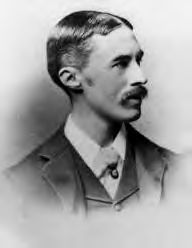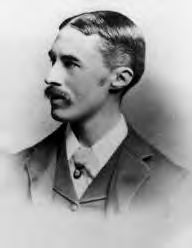
 Into The Past
Into The Past
Calliope's Place
Animated Verse
Links
Latest News
Into The Past
Open Book
Poets & Poetry
Email Us
Short Stories
Alfred Edward Housman (1859- 1936)


Biography
Born 26th. March, 1859, in Fockbury, Worcestershire, England; died 30th. April, 1936, in Cambridge, England.
British poet.
His father was a country solicitor who took to drink. His mother died when he was twelve. His brother Laurence was also gay, and his sister was a lesbian.
A. E. Housman went to Bromsgrove School where he won prizes for his poetry.
He won an open scholarship to St John's College, Oxford in 1877.
At Oxford he developed a 'passionate attachment' to a fellow student, Moses Jackson with whom he shared rooms, but who did not reciprocate his feelings. A. E. Housman's realisation of his own homosexuality may have distracted him from his studies. He was also worried about his father's illness and bankruptcy. He was also stubbornly concentrating on his classical studies at the expense of his other subjects. The combination of circumstances may explain why he failed the finals of his degree in 1881. He obtained a pass degree the following year.
He is said to have told Moses Jackson that he was the reason why he wrote poetry and was the subject of many poems.
Moses Jackson went to work at the London Patent Office and he got A. E. Housman a job there in 1882. A. E. Housman worked in his civil servant's job for nine years. A. E. Housman shared lodgings in London with Moses Jackson and his brother Adalbert from 1883 to 1885. However A. E. Housman may not have been able cope with the frustration of the lack of reciprocation from Moses Jackson and moved in to lodgings on his own. Adalbert Jackson may have also been gay and he and A. E. Housman may have had an affair. More Poems 41 and 42 were tributes to Adalbert Jackson after his sudden death from typhoid in 1892.
While at the Patent Office A. E. Housman was writing scholarly articles in classical studies on such authors as Horace, Propertius, Ovid, A Eschylus, Euripides, and Sophocles. He made himself into a distinguished classical scholar by his private studies, and he was appointed to the Chair of Latin at University College, London in 1892, and then he became Professor of Latin at Trinity College, Cambridge in 1911.
A. E. Housman's life revolved around Oxford, London, and Cambridge, but he was particularly fond of Shropshire and the villages of Clun, Clunbury, and Clungunford. His most famous work is A Shropshire Lad, (1896), which is a series of 63 verses set in a half-imaginary pastoral setting. In the poem "Terence, this is stupid stuff...", Terence is Moses Jackson. The unrequited love for Moses Jackson and the death of Adalbert Jackson may have provided the emotional triggers that led to the nostalgic and melancholic moods in A. E. Housman's work. The emigration of Moses Jackson to India in 1887 and his subsequent marriage added to the disappointment. When Moses Jackson was dying in Canada in 1922 A. E. Housman made an effort to complete his Last Poems so that Moses Jackson could have it.
In 1900 A. E. Housman was on holiday in Venice when he befriended a 23-year-old gondolier, Andrea. A. E. Housman then visited regularly, and when Andrea fell ill and was unable to work A. E. Housman sent him money.
A. E. Housman also travelled to Paris and Italy regularly to indulge in his gastronomic and sexual tastes.
A. E. Housman's homosexuality may not have been apparent to his readers although the clues to it in his poems are numerous. His reference to 'Lovely lads' that appears in A Shropshire Lad did not seem to cause any alarm, even though it was published just after the trials of Oscar Wilde.
A. E. Housman consistently refused to talk about his poetry for many years. However in 1933 he gave the lecture The Name and Nature of Poetry at the Senate House in Cambridge and this was attended by many leading literary figures of the day.
A. E. Housman's later poems are regarded as protests against the persecution of people like Oscar Wilde. A. E. Housman is reported to have sent an autographed copy of A Shropshire Lad to Oscar Wilde who was a friend of his brother Laurence Housman who was also gay.
A. E. Housman's poems became particularly popular during the First World War, but the critic James Agate said much later: "The popularity of the most widely read modern English poet is based on a complete misunderstanding of what his poems are about."
The two books that were published in A. E. Housman's lifetime would have given the knowing reader clues to his inclinations, but the volumes published posthumously by his brother Laurence were more candid. However, A. E. Housman's homosexuality did not become widely known publicly until 1967 when Laurence Housman published "A. E. Housman's 'De Amicita'," which is an essay written in about 1940 but deposited in the British Museum with a stipulation that it should not be published for twenty-five years.
A. E. Housman's ashes are buried in St Laurence's Church, Ludlow.
There is a Blue plaque on the house at 17 North Road, London, N6 where he lived from 1886 to 1905, and where he wrote A Shropshire Lad.






